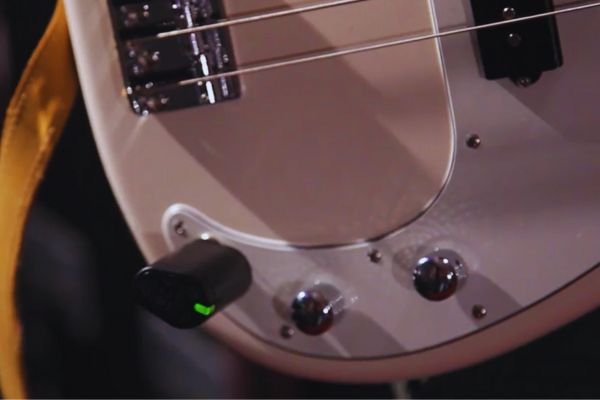The idea of being cable-free was a dream some years ago, but not anymore. As technology has advanced, wireless guitar systems have become increasingly popular for valid reasons, such as high range, high-quality sound, low latency and much more. A quality wireless guitar system now offers near-identical sound quality to a traditional wired connection. Additionally, some systems utilize advanced technologies such as frequency hopping to minimize interference. But the question remains, are wireless guitar system worth it? Let’s get to know everything about it, explore the pros and cons of wireless guitar systems and meet all your queries.
Are Wireless Guitar System Worth It?
In the early days of wireless guitar systems, there were significant issues with guitar signal quality, noise, dropouts, and frequency interference. But now they are more reliable than ever before. With technological advancements, wireless systems can operate on reliable frequency ranges and have longer battery life, making them a dependable option for any musician, like this Xvive U2 Guitar Wireless System. A reliable wireless guitar system can transmit sound seamless without losing quality. On top of it, you can get a high-quality wireless guitar system at a reasonable price. Overall, investing in a wireless guitar system gives you freedom of cables, convenience and improved sound quality. So, are wireless guitar system worth it? YES, it is a worthwhile expense that you can benefit from.

Are Cheap Wireless Guitar System Worth It?
Now that you know the answer to ‘Are wireless guitar system worth it’, you may ask, what about the cheap options?
Cheap wireless systems are more likely to suffer from signal dropouts, resulting in inconsistent signals and poor sound quality. This issue can be particularly problematic if you’re performing in a busy area where many other devices operate on similar frequencies. Moreover, cheaper wireless systems tend to have a limited range.
However, not all cheap wireless guitar systems are terrible. The best cheap wireless guitar systems offer a reliable and high-quality system for a fraction of the cost of their high-end counterparts. They provide crystal-clear sound quality, making them an excellent choice for gigs or home recordings.

Are Wireless Guitar Systems Reliable?
Wireless guitar systems are obviously reliable if they are of good quality and used in an environment with minimal interference. However, if the system is of poor quality or used in a location with many wireless signals, it may not be as reliable and can result in issues such as static, interference, and latency. So, choose a high-quality wireless system with reliable technology to ensure minimal interference and dropout.

Wired Vs Wireless Guitar System: Key Differences
Here’s a detailed comparison between wired and wireless guitar systems:
Power Source:
Wired systems use the cable to transfer the power and the audio signal, so no batteries or charging is required. In contrast, wireless systems use batteries to power the transmitter and receiver, which requires charging or replacing the batteries.
Reliability:
Wired systems offer a reliable and consistent signal with no latency or interference since the signal is transmitted through a dedicated cable. But wireless systems can be prone to interference from other devices, and signal dropouts can occur compared to wired systems.
Freedom of Movement:
Wired systems limit your mobility on stage, as you are tethered to your amplifier by the cable. Wireless systems allow you to move freely on stage without worrying about tripping over the cable, interact with the audience, and even jump into the crowd.
Range:
The length of the cable limits wired systems; the more the length, the more the range. Wireless systems can offer a range of up to 100 feet, allowing you to move around even the largest stages.
Pros and Cons of Wireless Guitar System
Wireless guitar systems have become increasingly popular for their convenience and ease of use. But as with any technological advancement, wireless guitar systems have advantages and disadvantages. Let’s take a closer look at them.
Pros:
Mobility: With a wireless guitar system, you can move freely on stage without being tethered to the amplifier. You can also walk around the audience, interact with them, and even step out for a solo without any interruption.
Sound Quality: A good quality wireless guitar system will deliver sound just as good as a wired system. In fact, many top-quality wireless systems utilize advanced tech to offer crystal-clear sound without any interference or loss of signal quality.
Convenience: Setting up a wired guitar system can be time-consuming and messy, especially when dealing with long cables. A wireless guitar system eliminates all that hassle and provides a quick and easy setup. You can even switch between guitars without having to swap out cables.
Increased Safety: With a wireless system, you can reduce the risk of tripping hazards and other electrical accidents.
Cons:
Battery Life: Most wireless systems only last a few hours after fully charging, which could be an issue for long performances or multiple sets. However, there are systems with longer battery life, and many systems include a battery life indicator so you know when to recharge.
Interference: Wireless systems are susceptible to interference from other devices that use radio frequencies, such as cell phones or other wireless equipment. However, top-quality wireless systems use advanced technology to minimize this interference and provide a clear signal.
Cost: Wireless guitar systems can be more expensive than wired systems.
Do Wireless Guitar Systems Have A Delay?
Wireless guitar systems can have a delay, but it largely depends on the type and quality of the system. The latency, or delay, of a wireless guitar system, is the time it takes for the signal from the guitar to reach the amplifier or effects processor. This delay can be caused by various factors, such as the distance between the transmitter and receiver, the quality of the wireless technology used, and even factors like interference from other electronic devices.
The good news is that most high-quality wireless guitar systems available today have very low latency, typically 2-4 milliseconds. To put this into perspective, a typical human reaction time is around 200 milliseconds, so a delay of 2-4 milliseconds is practically imperceptible.

Final Words
Wireless guitar systems are worth the investment for professional guitarists and enthusiasts alike. They provide greater mobility, improved sound quality, and reduced setup time, making them an essential piece of gear. While there are some drawbacks to wireless guitar systems, such as battery life and the potential for signal dropouts, these issues can be mitigated by choosing a quality wireless guitar system. Overall, are wireless guitar system worth it? YES, they far outweigh the drawbacks it comes with them.
